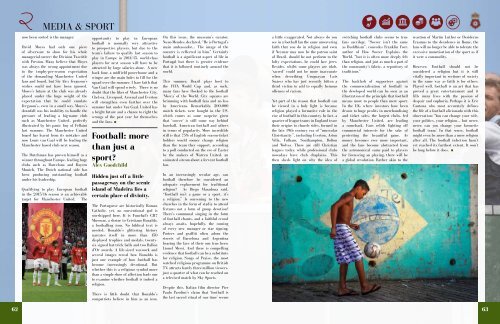The Future of Britain
Create successful ePaper yourself
Turn your PDF publications into a flip-book with our unique Google optimized e-Paper software.
MEDIA & SPORT<br />
now been sorted is the manager.<br />
David Moyes had only one piece<br />
<strong>of</strong> silverware to show for his whole<br />
managerial career: the Division Two title<br />
with Preston. Many believe that Moyes<br />
was always the wrong appointment due<br />
to the trophy-per-season expectation<br />
<strong>of</strong> the demanding Manchester United<br />
fans and board, but Sir Alex Ferguson’s<br />
wishes could not have been ignored.<br />
Moyes’s future at the club was already<br />
placed under the huge weight <strong>of</strong> the<br />
expectation that he could emulate<br />
Ferguson’s, even in a small way. Moyes’s<br />
downfall was his inability to handle the<br />
pressure <strong>of</strong> leading a big-name club<br />
such as Manchester United, perfectly<br />
illustrated by his panic buy <strong>of</strong> Fellaini<br />
last summer. <strong>The</strong> Manchester United<br />
board has learnt from its mistakes and<br />
now Louis van Gaal will be leading the<br />
Manchester based club next season.<br />
<strong>The</strong> Dutchman has proven himself as a<br />
winner throughout Europe, leading huge<br />
clubs such as Barcelona and Bayern<br />
Munich. <strong>The</strong> Dutch national side has<br />
been producing outstanding football<br />
under his leadership.<br />
Qualifying to play European football<br />
in the 2015/16 season is an achievable<br />
target for Manchester United. <strong>The</strong><br />
opportunity to play in European<br />
football is normally very attractive<br />
to prospective players, but due to the<br />
team’s failure to qualify last season to<br />
play in Europe in 2014/15, world-class<br />
players for next season will have to be<br />
attracted by large salaries alone. A new<br />
back four, a midfield powerhouse and a<br />
winger are the main holes to fill for the<br />
squad over the summer. I have faith that<br />
Van Gaal will spend wisely. <strong>The</strong>re is no<br />
doubt that the likes <strong>of</strong> Manchester City,<br />
Chelsea, Liverpool, Arsenal and Everton<br />
will strengthen even further over the<br />
summer but under Van Gaal, United has<br />
a bright future and a chance to right the<br />
wrongs <strong>of</strong> the past year for themselves<br />
and the fans. ƒ<br />
Football: more<br />
than just a<br />
sport?<br />
Alex Goodchild<br />
Hidden just <strong>of</strong>f a little<br />
passageway on the scenic<br />
island <strong>of</strong> Madeira lies a<br />
certain place <strong>of</strong> divinity.<br />
<strong>The</strong> Portuguese are historically Roman<br />
Catholic, yet, no conventional god is<br />
worshipped here. It is Funchal’s CR7<br />
Museum, a shrine to Cristiano Ronaldo,<br />
a footballing icon. No biblical text is<br />
needed; Ronaldo’s glittering history<br />
narrates itself in more than 150<br />
displayed trophies and medals, twentysix<br />
signed hat-trick balls and two Ballon<br />
d’Or awards. A life-sized waxwork and<br />
several images reveal how Ronaldo is<br />
just one example <strong>of</strong> how football has<br />
become increasingly devotional. But<br />
whether this is a religious symbol more<br />
than a simple show <strong>of</strong> affection leads one<br />
to examine whether football is indeed a<br />
religion.<br />
<strong>The</strong>re is little doubt that Ronaldo’s<br />
compatriots believe in him as an icon.<br />
On this issue, the museum’s curator,<br />
Nuno Mendes, declared, “He is Portugal’s<br />
main ambassador… <strong>The</strong> image <strong>of</strong> the<br />
country is reflected in him.” Certainly<br />
football is a significant aspect <strong>of</strong> life in<br />
Portugal but there is greater evidence<br />
that it is followed routinely around the<br />
world.<br />
This summer, Brazil plays host to<br />
the FIFA World Cup and, as such,<br />
many fans have flocked to the football<br />
‘Mecca’ <strong>of</strong> the World. City squares are<br />
brimming with football fans and no less<br />
by Americans. Remarkably, 200,000<br />
match tickets were bought in the US,<br />
which comes as some surprise given<br />
that ‘soccer’ is still some way behind<br />
baseball, American football and others<br />
in terms <strong>of</strong> popularity. More incredible<br />
still is that 75% <strong>of</strong> English season-ticket<br />
holders would sooner change religion<br />
than the team they support, according<br />
to a poll conducted on the eve <strong>of</strong> Easter<br />
by the makers <strong>of</strong> Warren United, an<br />
animated sitcom about a fervent football<br />
fan.<br />
In an increasingly secular age, can<br />
football therefore be considered an<br />
adequate replacement for traditional<br />
religion? As Diego Maradona said,<br />
“Football isn’t a game or a sport, it’s<br />
a religion.” Is convening to the new<br />
churches in the form <strong>of</strong> stadia to attend<br />
fixtures not a form <strong>of</strong> group devotion?<br />
<strong>The</strong>re’s communal singing in the form<br />
<strong>of</strong> football chants, and a faithful crowd<br />
always awaits, hopefully, the coming<br />
<strong>of</strong> every new manager or star signing.<br />
Posters and graffiti <strong>of</strong>ten adorn the<br />
streets <strong>of</strong> Barcelona and Argentina<br />
bearing the face <strong>of</strong> their one true hero:<br />
Lionel Messi. And there is compelling<br />
evidence that football can be a substitute<br />
for religion. Songs <strong>of</strong> Praise, the most<br />
watched religious programme on British<br />
TV, attracts barely three million viewers,<br />
just a quarter <strong>of</strong> what can be reached on<br />
a televised match by Sky Sports.<br />
Despite this, Italian film director Pier<br />
Paulo Pasolini’s claim that ‘football is<br />
the last sacred ritual <strong>of</strong> our time’ seems<br />
a little exaggerated. Not always do you<br />
see in a football fan the same unwavering<br />
faith that you do in religion and even<br />
if Neymar may now be the patron saint<br />
<strong>of</strong> Brazil, should he not perform to the<br />
l<strong>of</strong>ty expectations, he could face jeers.<br />
Besides, whilst some players are idols,<br />
‘sacred’ could not be more inaccurate<br />
when describing Uruguayan Luis<br />
Suárez who has just recently bitten a<br />
third victim to add to equally heinous<br />
<strong>of</strong>fences <strong>of</strong> racism.<br />
Yet part <strong>of</strong> the reason that football can<br />
be viewed in a holy light is because<br />
religion played a formative role in the<br />
rise <strong>of</strong> football in this country. In fact, a<br />
quarter <strong>of</strong> league teams in England trace<br />
their origins to church sides, formed in<br />
the late 19th century era <strong>of</strong> “muscular<br />
Christianity”, including Everton, Aston<br />
Villa, Fulham, Southampton, Bolton<br />
and Wolves. <strong>The</strong>re are still Christian<br />
leagues today, while pr<strong>of</strong>essional clubs<br />
nowadays have club chaplains. This<br />
then sheds light on why the idea <strong>of</strong><br />
switching football clubs seems to true<br />
fans sacrilege. “Soccer isn’t the same<br />
as Buddhism”, concedes Franklin Foer,<br />
author <strong>of</strong> How Soccer Explains the<br />
World, “but it is <strong>of</strong>ten more deeply felt<br />
than religion, and just as much a part <strong>of</strong><br />
the community’s fabric, a repository <strong>of</strong><br />
traditions.”<br />
<strong>The</strong> backlash <strong>of</strong> supporters against<br />
the commercialisation <strong>of</strong> football in<br />
the developed world can be seen as an<br />
illustration <strong>of</strong> the principle that football<br />
means more to people than mere sport.<br />
In the UK, where investors have been<br />
drawn to huge pr<strong>of</strong>its in merchandising<br />
and ticket sales, the largest clubs, led<br />
by Manchester United, are leading<br />
a comeback. Fans relish fighting <strong>of</strong>f<br />
commercial interests for the sake <strong>of</strong><br />
protecting the beautiful game. As<br />
money becomes ever more important,<br />
and the fans become abstracted from<br />
the astronomical sums paid to players<br />
for licenscing an playing, there will be<br />
a global revolution. Rather akin to the<br />
reaction <strong>of</strong> Martin Luther or Desiderus<br />
Erasmus to the decadence in Rome, the<br />
fans will no longer be able to tolerate the<br />
excessive monetisation <strong>of</strong> the sport as if<br />
it were a commodity.<br />
However, Football should not be<br />
considered a religion but it is still<br />
vitally important to sections <strong>of</strong> society<br />
in the same way as faith is for others.<br />
Played well, football is an art that has<br />
proved a great entertainment and it<br />
fills many lives with the passion <strong>of</strong><br />
despair and euphoria. Perhaps it is Eric<br />
Cantona who most accurately defines<br />
the life <strong>of</strong> a football aficionado with this<br />
observation: ‘You can change your wife,<br />
your politics, your religion… but never,<br />
never, can you change your favourite<br />
football team.’ In that sense, football<br />
might even be more than a mere religion<br />
after all. <strong>The</strong> football infection hasn’t<br />
yet reached its furthest extent, It won’t<br />
be long before it does. ƒ<br />
62<br />
63




